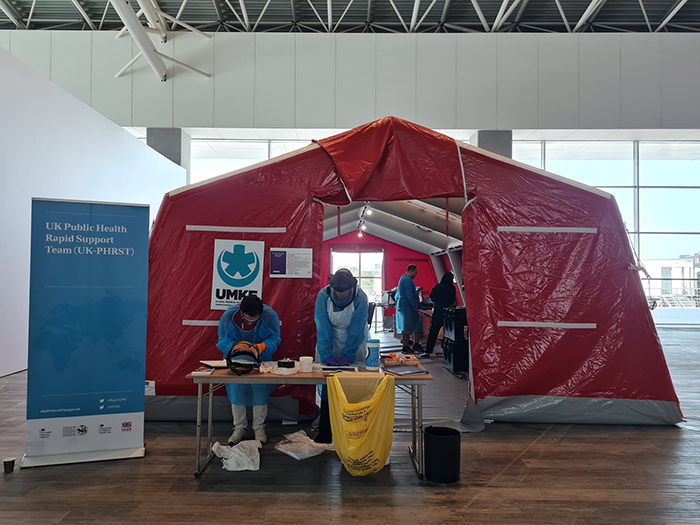
Read our case studies on how the UK-PHRST successfully help to combat outbreaks and protect countries against future threats to health through research and capacity strengthening activity. We achieve this by working alongside in-country staff from Minstries of Health, National Public Health Institutes, and other governmental and non-governmental organisations in low- and middle-income countries. 
Lessons learned from outbreak response have shown the importance of communities at-risk or affected by outbreaks leading on decision-making within the response. In the face of frequent public health emergencies, compounded by regional factors including forced migration and climate change, cross-border collaboration is essential to strengthening readiness for outbreaks. This case study describes the successful collaborative delivery of the first-of-its-kind cross-border Risk Communication and Community Engagement (RCCE) training to the Ministry of Health, Red Cross/Crescent National Society, UNICEF and WHO staff from seven East African countries.
Making mental health and psychosocial support part of outbreak response
Although mental health affects everyone, whether it’s people trying to maintain their mental wellbeing or those living with a mental health condition, it is often forgotten about in the response to a public health emergency. Read about the work of UK-PHRST Mental Health and Psychosocial Support (MHPSS) team across research, capacity strengthening and outbreak response.
Using PPE in outbreak response
The UK-PHRST's expertise in infection and prevention and control, which includes the use of Personal Protective Equipment (PPE), is used to protect people from infection in disease outbreaks. PPE can diminish transmission when used as part of an integrated package of measures, and crucially helps protect medical staff from disease, but there is variation in the need for, and use of PPE for different diseases, across countries, and differing views on its necessity. As such, this project investigated the use of PPE to protect people from Lassa Fever, in specific Lassa Fever Treatment Centres (LTCs) across Nigeria.
What does it take to deploy rapidly?
No two outbreaks are the same. The operations team can safely say that there is a need to remain alert, agile, and consistently open to change. Regardless of the mode of deployment, destination or disease, there are always new challenges to navigate. Find out what it takes to deploy UK-PHRST staff and remain constantly operationally ready.